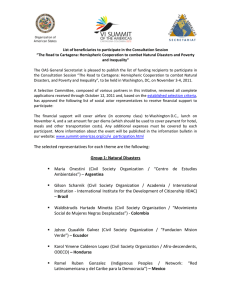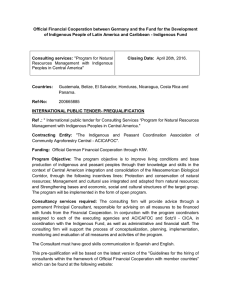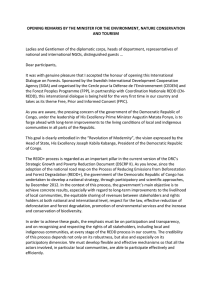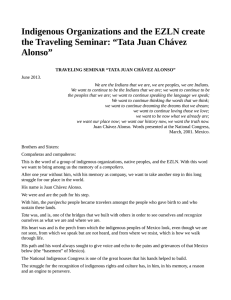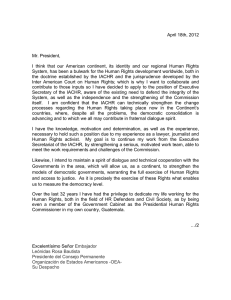Informal consultations (8 August 2014)
Anuncio
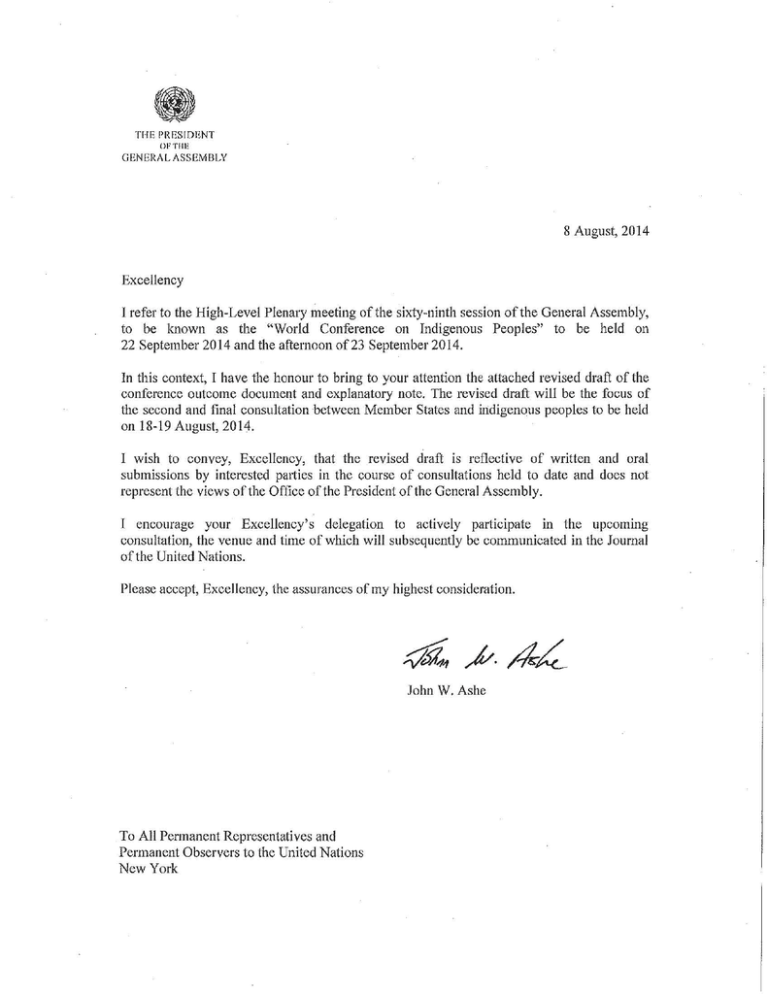
(tfi~ ~ N ~$ TIlE PRESIDENT OFTIIE GENERAL ASSEMBLY 8 August, 2014 Excellency I refer to the High-Level Plenary meeting ofthe sixty-ninth session of the General Assembly, to be known as the "World Conference on Indigenous Peoples" to be held on 22 September 2014 and the afternoon of23 September 2014. In this context, I have the honour to bring to your attention the attached revised draft of the conference outcome document and explanatory note. The revised draft will be the focus of the second and final consultation between Member States and indigenous peoples to be held on 18-19 August, 2014. I wish to convey, Excellency, that the revised draft is reflective of written and oral submissions by interested palties in the course of consultations held to date and does not represent the views of the Office of the President of the General Assembly. I encourage your Excellency's delegation to actively participate in the upcoming consultation, the venue and time of which will subsequently be communicated in the Journal of the United Nations. Please accept, Excellency, the assurances of my highest consideration. John W.Ashe To All Permanent Representatives and Permanent Observers to the United Nations New York Draft 8 August 2014 Draft outcome document to be adopted by the General Assembly on 22 September 2014 69/. Outcome document of the High-level Meeting of the General Assembly: The World Conference on Indigenous Peoples The General Assembly Adopts the following outcome document: Outcome document of the High-level Meeting of the General Assembly: The World Conference on Indigenous Peoples 1. We.- the Heads of State and Government, Ministers and representatives of Member States, noting our solemn commitment to the purposes and principles of the United Nations Charter, in a spirit of cooperation with the Indigenous Peoples of the world, assembled at United Nations Headquarters in New York on 22 and 23 September 2014, on the occasion of the World Conference on Indigenous Peoples, to reiterate the important and continuing role of the United Nations in promoting and protecting the rights ofindigenous peoples. [chapeaux] 2. We welcome the contribution of indigenous peoples to the World Conference in terms of articulating the issues of greatest importance to them, as set out in the Alta Outcome Document 1 emanating from the Global Indigenous Preparatory Conference for the World Conference on Indigenous Peoples held in Alta, Norway, in June 2013 (Annex 1). We also note the inclusive preparatory process for this High-level Plenary meeting, including the comprehensive engagement of the representatives of indigenous peoples. [chapeaux} 3. In adopting this outcome document, we commit to consult and cooperate in good faith with indigenous peoples through their own representative institutions in order to obtain their free, prior and informed consent before adopting and implementing legislative or administrative measures that may affect them. [chapeaux - new OP] 4. We reaffirm our solemn commitment to promote and advance the rights of indigenous peoples, including the United Nations Declaration on the Rights of Indigenous Peoples adopted by the General Assembly on 13 September 2007 2 , 1 A/67/994. 'AiRES/61i295. Draft outcome document of the high-level meeting of the General Assembly on the wo ... d . conference on indigenous Ilcoples 8 August 2014 which sets the minimum standards for the survival, dignity, and well-being of the Indigenous Peoples of the world. [OPt] 5. We recall other major achievements of the past two decades in building an international framework for the advancement of the rights and aspirations of the world's indigenous peoples, including th"e establishment of the Permanent Forum on Indigenous Issues, the creation of an Expert Mechanism on the Rights of Indigenous Peoples, and the appointment of a Special Rapporteur on the Rights of Indigenous Peoples. [OP2] 6. We commit to actions at the national level intended to achieve the ends of the United Nations Declaration on the Rights of Indigenous Peoples, including as appropriate, legislative measures, and to promote awareness of it among all sectors of society, especiaIly Members of Parliament, the judiciary, electoral officers, educators and the civil service. [OP4 &5] 7. We encourage those states that have not yet ratified or acceded to the International Labour Organization Indigenous- and Tribal Peoples Convention, 1989 (no. 169)3, to consider doing so and recall the obligation of ratifying States to take all necessary measures to make its provisions effective. IOP6] 8. We commit to implement national action plans devoted to achieving the ends of the United Nations Declaration on the Rights of Indigenous Peoples. We will cooperate with indigenous peoples through their own representative institutions in the preparation of such plans. [OP7] 9. We acknowledge that indigenous peoples have the right, without discrimination, to the improvement of their economic and social conditions. We therefore commit to include in national action plans, special measures to address the rights and needs of indigenous persons with disabilities. [new OP] 10. We commit to cooperate and coordinate with indigenous peoples to disaggregate data and utilise cultural indicators to better understand and address the situation and needs of indigenous peoples, particularly elders, women; youth, children and persons with disabilities. [OPll] 11. We commit to ensure equal access to, and empower indigenous peoples to deliver as far as possible, high-quality and culturally adequate education, health, housing, and other economic and social programmes to improve their well-being, through the provision of adequate resources. [OP3t] 12. We commit to ensure that indigenous peoples enjoy the highest attainable standard of physical and mental health, including with respect to sexnal and reproductive health, HIV, and non-communicable diseases, through the provision of adequate resources. [new OPJ 13. We acknowledge the importance to indigenous peoples of development of their youth, in accordance with their aspirations and needs, and ensuring the transmission of traditional knowledge, innovation, languages and practices. We will support indigenous peoples in the development of indigenous youth, by providing adequate resources. [OP32] 14. We acknowledge that indigenous peoples' justice institutions can playa positive role in dispute resolution and contribute to harmonious relationships within :> 215 United Nations, Treaty Series, vol. 1650, No. 28383. Draft outcomc documcnt of the high-level meeting of the General Assembly on the wol'ld confcrencc on indigenous peoples 1 August 2014 indigenous peoples' communities and within society, in line with international human rights standards. We commit to coordination and dialogue with indigenous peoples' justice institutions, where those institutions exist. [OP8 & OP9] 15. We will increase as a matter of priority, in cooperation with indigenous peoples, our efforts to prevent and eliminate all forms of violence and discrimination against indigenous women, youth and children, including by strengthening relevant legal, policy and institutional frameworks. [OPlO] 16. We commit to establish at the national level, where appropriate and necessary and in conjunction with indigenous peoples concerned, fair, independent, impartial, open and transparent mechanisms to acknowledge, advance and adjudicate the rights of indigenous peoples pertaining to their lands, territories and resources. [OP22} 17. We commit to define and where appropriate provide, in conjunction with indigenous peoples, programmes and resources to protect and support indigenous peoples' traditional occupations, economies, livelihoods, and food security. [OP231 18. We commit to address the impact or potential impact of major development projects, including extractive industries, on indigenous peoples to ensure transparency and benefit sharing. Whel'e appropriate, the right~ of indigenous peoples regarding development of their lands, territories and resources, will be incorporated into law, policies and practice. [OP25] 19. We commit to give effect to indigenous peoples' right to their religious and cultural sites, including access to and repatriation of ceremonial objects and human remains. We will ensure fail', transparent and effective mechanisms are established, in conjunction with indigenous peoples concerned. [OP12, OP26] 20. We urge Member States to initiate processes to demilitarize indigenous peoples lands and territories, unless militarization is justified by a relevant public interest. Where militarization exists, we urge Member States to immediately commence effective consultations with the indigenous peoples concerned. [OP33] 21. We invite the United Nations Human Rights Council, in cooperation with the High Commissioner for Human Rights, and in oonsultation with indigenous peoples, to recommend to the 71 st session of the General Assembly on the occasion of the tenth anniversary of the United Nations Declaration on the Rights of Indigenous Peoples, options to use existing United Nations mechanisms to more effectively promote respect for and full application of the United Nations Declaration on the Rights ofIndigenous Peoples. [OP13] 22. We invite Human Rights Treaty bodies to consider the United Nations Declaration on the Rights of Indigenous Peoples as appropriate. We commit, where relevant, to include information regarding indigenous rights and the implementation of the United Nations Declaration on Indigenous Peoples in our reports to Human Rights Treaty bodies and in Universal Periodic Review procedures. [OP14] 23. We welcome the increasingly important role of national human rights institutions 4, as well as civil society, the private sector, and academia, in the promotion and protection of the human rights of indigenous peoples and encourage their active role in achieving the ends of the Declaration on the Rights ofIndigenous Peoples. [OP16] 4 AlRES/68/171. 3/5 Draft outcome document of the high-level meeting of the Genernl Assembly 0'1 the world conference on indigenuus peoples 8 Augu't 2014 24. We request the Secretary-General, in consultation and cooperation with indigenous peoples, Member States, and other relevant stakeholders, to develop a System-wide Action Plan to achieve United Nations system coherence which, through the mobilization inter alia of financial cooperation and technical assistance , will contribute to the full realization of the provisions of United Nations Declaration on the Rights ofTndigenous Peoples.lOPt7) 25. We invite the Secretary General, in light of the need for increased awareness of the rights of indigenous peoples, to give consideration to the appointment of a United Nations official at the highest possible level. [OPIS) 26. We invite the Special Rapporteur on Violence against Wl?men to consider continuing to examine the causes and consequences of violence against indigenous women and girls within her mandate. We also call upon the Commission on the Status of Women to consider I' the empowerment of indigenous women" as a theme for a future session, to be undertaken in consultation with the United Nations Permanent Forum on Indigenous Issues. rOPI91 27. Building on the report of the Secretary-General on ways and means of promoting participation at the United Nations of indigenous peoples' representatives on the issues aiIecting them S, and recognizing the right of indigenous peoples to maintain and strengthen their distinct political institutions, we request the Secretary- General to further develop proposals to the General Assembly on enhanced participation of indigenous peoples' at the United Nations. [OP201 28. We invite ECOSOC to consider a broad discussion, during its Coordination and Management meetings and under the agenda item on Social and Human Rights Questions, which will explore system-wide in the UN the policies and procedures on indigenous peoples within ECOSOC subsidiary bodies, engaging with Indigenous peoples and the relevant United Nations mechanisms. [new OPI 29. We recognize and respect the relevance of the experiences of indigenous peoples to securing sustainable development. This includes knowledge generated through experience in hunting, gathering, fishing, pastoralism and agriculture, as well as their sciences, technologies and cultures. [OP29 & OP30] 30. We agree that indigenous peoples' knowledge and strategies to sustain their environment should be respected when we develop national and international policies, standards and measures all climate change prevention, mitigation and adaptation. [OP30) 31. We decide to give due consideration to the rights of indigenous peoples in the post-20 15 development agenda and to mainstream the promotion and protection of these rights into the development agenda at the national, regional and international levels. [OP281 32. We invite Member States, the private sector, and other institutions to contribute to the United Nations Voluntary Fund for Indigenous Peoples, the United Nations Trust Fund on Indigenous Issues, IFAD Indigenous Peoples Assi stance Facility, and the United Nations Indigenous Peoples Partnership as a means of promoting the rights of indigenous peoples worldwide. rOP361 , NHRC/21/24. 4/5 Drnft outcome document ofthe high-Icvel mecting ofthc General Assembly on the world confcrence 011 indigenous peoples ' 1 August 2014 33. We request the Secretary General to include a specific focus on indigenous peoples in the final report on the achievement of the millennium development goals, [OP381 34, We request the Secretary-General, in coordination with all the relevant United Nations system entities, to report on progress to the 71st session of the General Assembly and make recommendations, as appropriate, for further concrete steps to implement this outcome document. [OP37 & OP391 5/5 Explanatory notes: draft outcome document - World Conference on Indigenous Peoples OPl-3 The chapeaux has been become three operative paragraphs due to its increasing length. It now includes a reference to the UN Charter, as requested by some Member States. OP3 is a new paragraph which covers the issue of "free, prior and informed consent" early in the outcome document, avoiding the need for later repetition. It reflects Article 19 ofthe Declaration on the Rights ofindigenous Peoples. OP4 This paragraph reflects Article 43 of the Declaration on the Rights of Indigenous Peoples concerning "the minimum standards for the survival, dignity and wellbeing of the indigenous peoples of the world". OP6 This paragraph draws on language from Resolution 66/142 (OP4) which encourages states to take "the appropriate measures, including legislative measures, to achieve the ends" of the Declaration on the Rights of Indigenous Peoples. OP9 The paragraph draws on language fi'om Articles 21 and 22 ofthe Declaration on the Rights ofindigenous Peoples. OPIO The intention of "data disaggregation" in this paragraph is solely to aid public policy that would benefit indigenous peoples. OPll This paragraph draws on language from Atticles 14,21,23 and 24 of the Declaration on the Rights ofIndigenous Peoples. OP12 This paragraph draws on Atticle 24 of the Declaration on the Rights ofIndigenous Peoples. OP 16 This paragraph draws on Atticle 27 of the Declaration on the Rights ofIndigenous Peoples. OPI9 This paragraph draws on Atticle 12 of the Declaration on the Rights ofIndigenous Peoples. OP20 This paragraph draws on Article 30 of the Declaration on the Rights ofIndigenous Peoples. OP21 This paragraph seeks to give effect to the intention of Alticles 41 and 42 ofthe Declaration on the Rights of Indigenous Peoples. OP24 The SWAP seeks to give effect to the intention of Articles 41 and 42 ofthe Declaration on the Rights ofIndigenous Peoples. OP25 This paragraph seeks to give effect to the intention of Articles 41 and 42 of the Declaration on the Rights of Indigenous Peoples. OP27 This paragraph reflects Alticles 5 and 20 of the Declaration on the Rights ofIndigenous Peoples. OP31 This paragraph draws on resolution 681149 (OP7). General observations The revised draft has re-ordered paragraphs from the zero-draft and removed the numbered sections (I, II, etc). For ease cfuse. previous paragraph numbers (Le. as they appeared in the zero-draft) are referenced at the end of each new OP in bold text. The outcome document has tried to minimise the use of "where relevant" and "where appropriate" to improve readability. It can be noted that the Declaration on the Rights ofIndigenous Peoples also avoids this language. The resolution is termed an "outcome docurnent'j, to avoid confusion with the Declaration on the Rights of Indigenous Peoples. In regard to the status ofthe Declaration on the Rights ofIndigenous Peoples, the following observation of the Committee on the Elimin~tion of Racial Discrimination is noted: "the Committee finally recommends that the Declaration [on the Rights of Indigenous Peoples1be used as a guide to interpret the State party's obligations under the Convention [on the Elimination of Racial Discrimination] relating to indigenous peoples l ... 1 CERD/C/uSAlCOl6 (8 May 2008), para 29.
